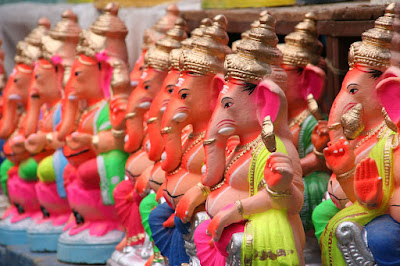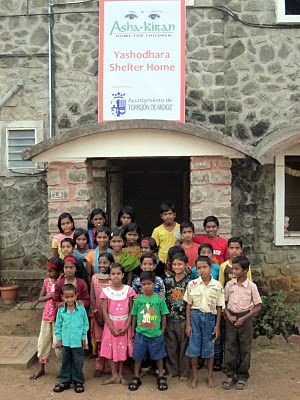Tuesday, October 4, 2011
THE CITY HALL OF TORREJÓN DE ARDOZ AND THE UNIVERSITY OF SEVILLE BACK YASHODHARA ONCE AGAIN
The 2011-2012 period is especially important for our Project because we have added a new component to it that will make it possible for us to reach out to more vulnerable families. The aim is to ensure that all children who come to Yashodhara with a need for protection receive the specific attention they require. There are many cases of extremely impoverished mothers who approach our Project to give their children a better quality of life. As Yashodhara has a limited housing capacity, this new element of external support will allow us to work with mothers and their children in their own communities, counselling them and giving them the necessary tools take proper care of their families.
The City of Torrejon de Ardoz has backed Yashodhara with a grant of 5500 Euros, while the University of Seville has awarded us 6000 Euros, doubling the contribution they made last year.
The link between the City Hall and Asha-Kiran will also allow us to support awareness-raising activities done by the Department of Immigration in events such as Children's Day and Youth Week.
Our sincere gratitude to both entities for their ongoing support on our way to achieve a more just world for children.
Monday, October 3, 2011
YOUNG TEACHERS
The way to implement this Program involves
• teaching reading and writing in Marathi, the local language
• teaching basic maths
• adjusting study time to the staff’s work hours
• promoting relaxation in learning so that education may flow unimpeded.
A particularly interesting point is that the teachers are the children of the Shelter who are in higher grades.
Thus, this teaching-learning process is a continuous cycle that enriches all of those involved – on the one hand, the children are nourished by the friendly presence of the adults around them, their care and the food prepared for them. On the other hand, the staff acquire practical and useful skills that will contribute to their self-esteem and autonomy, while the children consolidate their knowledge and have a chance to pay back the attention and affection they get.
Sunday, October 2, 2011
INTERNATIONAL DAY OF NON-VIOLENCE
 The International Day on Non-violence is celebrated worldwide coinciding with Ghandi’s birthday. But even though many events are organized of this date, we tend to lose sight of the objective throughout the year and violence goes on unabated.
The International Day on Non-violence is celebrated worldwide coinciding with Ghandi’s birthday. But even though many events are organized of this date, we tend to lose sight of the objective throughout the year and violence goes on unabated.Douglas Roche struck the nail on the head when he noted that “the world is experiencing a fundamental crisis... We are at the point where we are capable of destroying life on earth, while the culture of peace offers the vision of global ethics toward life in full vibrancy”.
http://www.un.org/en/events/nonviolenceday/sgmessages.shtml
http://www.mauritiustoday.com/news/articles/16046/1/The-International-Day-of-Non-violence/Page1.html
Tuesday, September 20, 2011
WHOLESOME DISCIPLINE
- allowing him to responsibly choose his behavior once he knows its consequences
- clearly conveying the importance of rules and discipline and then trusting the child's common sense
-motivating the child to find a solution to correct any mistakes
-not accepting inappropriate behavior, but always accepting the child
-emphasizing good communication
-never opting for physical or mental harassment.

Thursday, September 15, 2011
GANESH CHATURTHI
 India is a country where colorful festivals and celebrations take place throughout the year. Not a single month in the Hindu calendar is devoid of a ‘sacred’ day. One of these celebrations is the festival of Ganesh Chaturthi. Ganesh is revered in India as the god of wisdom, prosperity and good fortune, and is invoked when starting any business or journey. It is believed that this god grants his presence to his devotees for the duration of the festival. In the State of Maharashtra, the event is celebrated not only by Hindus but also Muslims, Jains and Christians.
India is a country where colorful festivals and celebrations take place throughout the year. Not a single month in the Hindu calendar is devoid of a ‘sacred’ day. One of these celebrations is the festival of Ganesh Chaturthi. Ganesh is revered in India as the god of wisdom, prosperity and good fortune, and is invoked when starting any business or journey. It is believed that this god grants his presence to his devotees for the duration of the festival. In the State of Maharashtra, the event is celebrated not only by Hindus but also Muslims, Jains and Christians.
Friday, September 9, 2011
A needed change in CORPORATE RESPONSIBILITY LAWS
 The first time Suhasini fainted while she worked in the cotton fields, the farmer shouted at her for slacking. "The smell of pesticide made me feel like vomiting," says the nine-year-old. "First it gave me a bad headache. Then I felt sick and dizzy." The next time Suhasini fainted was more serious. The farmer had to take the delirious girl to the nearest hospital. Later Suhasini discovered he’d docked the cost of her medical treatment from her 15 rupee (22 cents) daily wage.
The first time Suhasini fainted while she worked in the cotton fields, the farmer shouted at her for slacking. "The smell of pesticide made me feel like vomiting," says the nine-year-old. "First it gave me a bad headache. Then I felt sick and dizzy." The next time Suhasini fainted was more serious. The farmer had to take the delirious girl to the nearest hospital. Later Suhasini discovered he’d docked the cost of her medical treatment from her 15 rupee (22 cents) daily wage.
Saturday, September 3, 2011
FRESH HUGS

We had another visitor at Yashodhara Shelter: Fernando Munarriz of San Sebastian, Basque Country. Fernando is the Sponsor of Kishor, a seven year old child. Fernando's sister, Maria Jose, is also the Sponsor of another child at the Shelter. Fernando was making a tour around China and India and made a stop for several days in Pune as he wished to meet Kishor and establish a closer bond with him.
Fernando brought gifts for Kishor and the other children, who received them same way they welcome visitors: with enthusiasm and openness. There was no favouritism; no jealousies arose among the children since they are used to sharing their toys and even clothes with their peers. As Kishor's birthday was near, his Sponsor dove into the adventure of buying clothes at a bazaar in the city of Pune together with Eshana, our co-worker who lives at the Shelter and who knows the children’s sizes and tastes.
As regards Fernando, he got to taste and enjoy the atmosphere his godson is living in, and gave him plenty of affection and hugs. At Yashodhara, receiving and giving are in balance and lead to the wonder of sharing.



